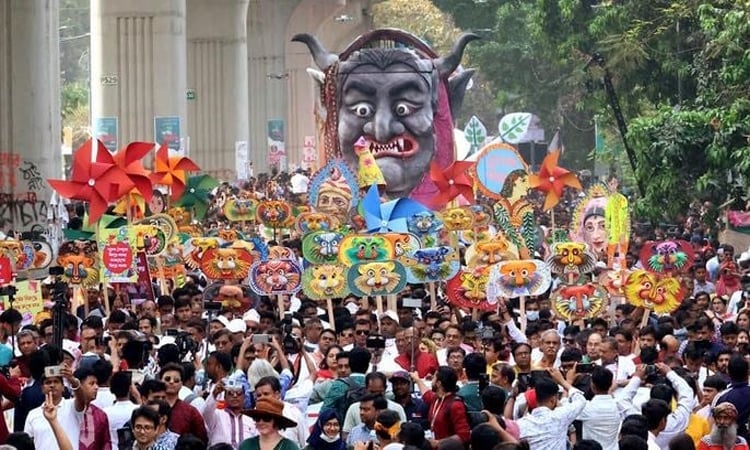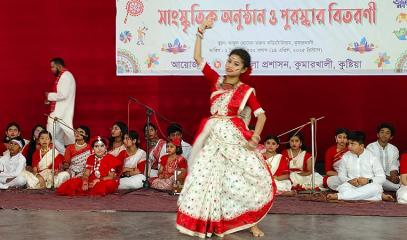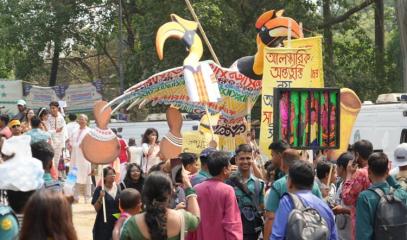Dhaka celebrates Pohela Boishakh for a new year of ‘peace and harmony’
A climate of ‘universal celebration’ characterised the Bengali New Year of the year 1432 yesterday. An anniversary that unites followers of different religions in a country that has been going through serious political and social turmoil in recent months. Christian Association of Bangladesh: ‘It is an integral part of our history and our culture’.
Dhaka (AsiaNews) - A festive atmosphere, with colours and a shared hope for peace and harmony, characterised the Bengali New Year in the year 1432, celebrated yesterday throughout Bangladesh.
From the first light of dawn, the country came alive with a constant succession of songs, poems, artistic performances and age-old rituals in honour of Pohela Boishakh, a festival deeply rooted in the culture and identity of this South Asian nation.
This year the celebrations have returned in full swing after three years of interruptions and restrictions due to the Covid-19 pandemic. From bustling cities to rural villages, the Baisakhi fairs, cultural performances and the traditional Mangal Shobhajatra procession have brought people together in a spirit of unity, transcending religious and ethnic differences.
For one day the divisions between Muslims, Hindus, Christians and Buddhists vanish, because all the citizens of Bangladesh come together to celebrate a festival that belongs to everyone. ‘The Bengali New Year is a universal festival. People of all faiths come together in a spirit of harmony. I hope this spirit will grow stronger,’ Omar Faruk, a Muslim businessman from Dhaka, told AsiaNews.
An essential part of the New Year celebration is Halkhata, the ceremonial opening of new account books by shopkeepers and traders; a practice that dates back to the reign of Emperor Akbar, who introduced the Bengali calendar to simplify tax collection.
On this day, businesses welcome customers with sweets and smiles, marking a new beginning with gratitude and goodwill. Although the joy was palpable, there were also concerns and fears related to the changed political and social conditions, combined with misinformation circulated online about the future of Mangal Shobhajatra, an iconic procession organised by the Faculty of Fine Arts of the University of Dhaka.
Despite the rumours and controversy surrounding the name change, the university decided to go ahead with the procession, affirming its importance as a symbol of justice, harmony and resistance against oppression. ‘This procession is not just a cultural event: it's a statement,’ explains Dip Hossan, a university student. ‘It connects people with the message of good prevailing over evil.’
The day began in the capital with the Chhayanaut musical gathering under the ancient banyan tree in Ramna Park. Since 1967, the institution dedicated to Bengali culture has organised this event as a protest against attempts to suppress their identity during the years of Pakistani rule. Not even a bomb attack in 2001, which caused nine deaths, managed to stop this tradition. And this year too the crowd was undeterred, a testament to the enduring resilience of the Bengali spirit.
From Dhaka to Chittagong, Sylhet, Rajshahi, Khulna and beyond, the festive atmosphere characterised the whole country, with the police on high alert to ensure safety and allow people to enjoy the celebrations in security.
As people danced, sang and wore traditional red and white clothing, the streets were filled with a sense of rebirth and renewal. In addition to the cultural vibrancy, Pohela Boishakh also helped to give a strong boost to the economy with record sales of clothing, handicrafts, sweets and festive items.
‘We are not only celebrating a new year, but also strengthening our economy and community ties,’ said the owner of a stall at a fair in Dhaka. “It is a day of joy, business and hope,” added the trader.
Christians also actively participated in the festivities, which coincide with the Holy Week celebrations. Hemanta Corraya, secretary of the Bangladesh Christian Association, said in a message: ‘Bengalis living at home and abroad are celebrating Pohela Boishakh. It is an integral part of our history and our culture. May this first day of Baishakh bring peace and harmony to all. Let us move forward with the determination to build a beautiful and united country’.
Despite the challenges – past and present – the Bengali New Year remains a proud and vibrant celebration of local cultural identity and coexistence. It is a reminder that the essence of being Bengali lies in shared traditions, mutual respect and the collective hope for a better future. When the sun set on the first day of 1432, it left behind a renewed sense of optimism: through unity in diversity, Bangladesh can continue to grow as a nation rooted in harmony, history and hope.
07/02/2019 17:28









.png)










